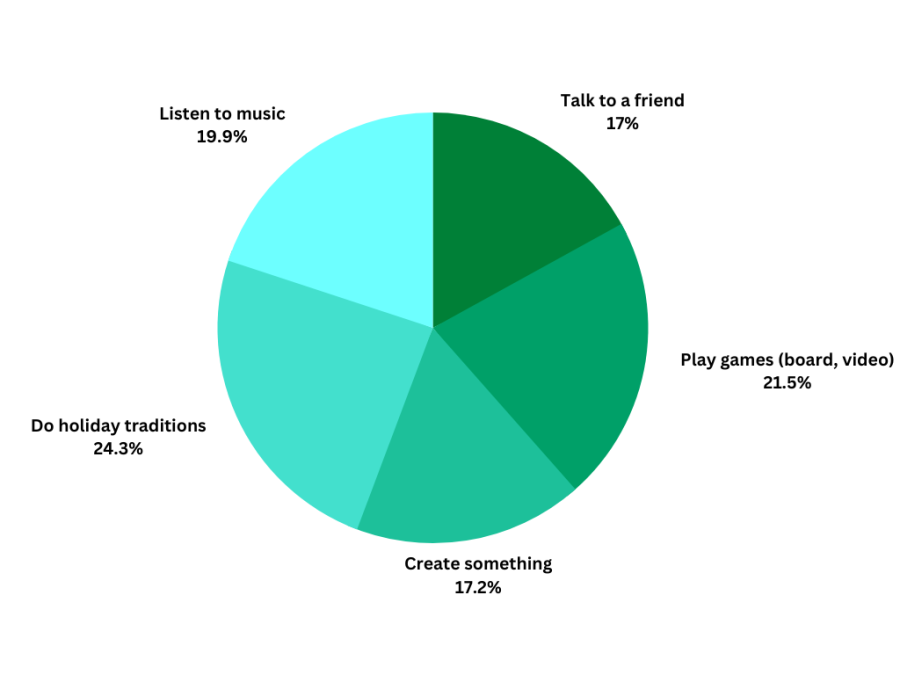Heated Holidays
Students and counselors share their experiences and help with navigating seasonal stress.
December 8, 2022
On paper, the holiday seasons are a time of joy, cheer and goodwill toward men. But sometimes life gets messy, turkey gets burnt and Christmas spirit gets put on the back burner. The hustle and bustle can cause negative emotions, so learning how to deal with them can help maintain holiday cheer.
Adam Neff, a counselor at Beyond Healing Center in Springfield, explains the relationship between these emotions and shares how they affect him.
“Stress and anger kind of go hand in hand,” Neff said. “In a way, they are synonyms for each other. Lots of reasons cause anger but it’s usually an unmet need. It is a normal feeling to have, but anger is a secondary emotion. I don’t get irritated during the holidays, and that is because I have a lot of great resources for self-care. I do however get stressed, but I simply just reflect on what the holidays are supposed to be about and remember that everybody is going through something.”
During the winter months, it can be easier to come off as irritated due to the change in temperature. Junior Sophia Stricklin shares how chilly days can be frustrating.
“Colder weather [can affect me because] I don’t get out as much and there’s not [as much] sun,” Stricklin said.“I think the sun energizes anyone and makes people happier.”
Having fewer hours of daylight leaves people with little time for outdoor activity, which can have negative effects on people. Neff offers an explanation.
“People experience seasonal affect which is when, in the fall or winter when the sun is not out as long, it can have an effect on your mood, and then people not being able to get out as much can also have an impact,” Neff said. “Not being able to take care of yourself in that way can be irritating”
The need to succeed under the scrutiny of family and tight budgets can cause stress.
“Money problems during the holidays are a big thing, especially with parents because I feel like they feel a lot of pressure to make the perfect Christmas,” Stricklin said. “My mom cooks for our Thanksgiving, which is really cool, but she also gets more stressed out because she wants it to be the best that it can be.”
Junior Brycen Osborne shares how facing the source of one’s feelings head-on can be difficult, but ultimately relieving.
“I deal with stress and anger in similar ways,” Osborne said. “If it is something that I can confront, like a person, then I’ll confront it and try and fix it. Most of the time it isn’t that simple. So what I do is I remove myself from that situation. It gives me time to collect my emotions and my thoughts on how I should deal with the situation. Sometimes it takes a day, sometimes several days, or sometimes even several weeks.”
Thankfully, there are many ways to relieve stress during the winter seasons.
“The holiday I get the most stressed during is Christmas, because there’s a lot going on. Usually, I’ll try to do something calming, [like] decorating my room for Christmas,” Stricklin said. “I’ll try to make holiday plans with people, Madelyn [Middleton] and I have the holiday tradition where we watch The Princess Switch and drink hot cocoa every year, and that helps me deal with stress too.”
Learning to leave stressful events can also be beneficial for maintaining peace during the holidays.
“Remove yourself from those situations. Not necessarily avoiding your problems but taking time to think about a resolution with a clear head and calm emotion,” Osborne said. “I don’t recommend pushing away your emotions. It’s a habit I have and it only gets worse the more you do it because it will build up and erupt.”
Neff drives the point home by bringing the lack of logical reasoning to light.
“The biggest thing I would recommend for [dealing with] anger is to remember that when emotions are high logic is low because the brain can only hold a single thought at a time,” Neff said. “So if we notice that our emotions are getting the best of us, then we probably need to take a break, but we have to eventually come back to it. We can’t just ignore it.”







